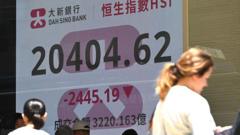The escalation of trade tensions has led to significant financial turmoil across Asian economies, deepening concerns not only for exports but for global economic stability.
**Asian Markets Face Severe Decline Amid Trump's Tariff Announcement**

**Asian Markets Face Severe Decline Amid Trump's Tariff Announcement**
Asian stock markets plummet as uncertainty surrounding US tariffs raises fears of economic recession.
Asian stocks suffered their worst decline in decades on Monday, triggered by US President Donald Trump's recent tariff announcements, which have rattled global markets and sent investors into a panic. Major indices from Shanghai to Tokyo and Sydney to Hong Kong experienced steep losses: at one point, the Shanghai Composite index plummeted over 8%, while Hong Kong's Hang Seng recorded a staggering loss of more than 13%. Japan’s Nikkei 225 also felt the shock, closing down by 7.8%, which analysts have described as nothing short of a "bloodbath."
The impact of these tariffs is particularly acute for Asia's manufacturing sectors, which heavily rely on exports to the US. Countries such as Japan and South Korea will see tariffs as high as 26%, while Vietnam has been earmarked for a daunting 46% levy, following accusations from Trump labeling it a "worst offender." Other nations like Cambodia and Thailand also face exorbitant tariffs, with China expected to bear the brunt at a total of 54%. Countries like Singapore, Australia, and New Zealand are already grappling with a baseline 10% tariff.
"The effects of the US tariff increases are being felt deeply across Asia," stated Qian Wang, Asia Pacific chief economist at Vanguard. As fears mount that a global trade war could precipitate a recession in the US, the world's largest economy, the reverberations could further squeeze Asian exports. Following public holidays last week, markets in China, Hong Kong, and Taiwan saw pronounced declines, with Taiwan experiencing its largest drop on record at 9.7% and the ASX 200 in Australia falling by 4.2%.
Analysts observe that mounting inflationary pressures from tariffs may lead to recession expectations. Goldman Sachs has increased its projected likelihood of a US recession next year to 45%, while JPMorgan suggests a 60% probability of both US and global downturn. Small open economies in Asia, particularly those reliant on US trade, are particularly vulnerable.
Trade statistics underscore this reliance; for example, Vietnam produces goods for major US brands, including Nike, whereas Bangladesh's garment industry exports approximately $8.4 billion worth to the US annually. The introduction of a 37% tariff by Trump on Bangladeshi goods adds further strain to these economies that are already at risk.
Frank Lavin, a former undersecretary for international trade, emphasized that Asia is likely to suffer disproportionately from these developments due to its significant export reliance on the US compared to other regions. China's response includes implementing its own tariffs, further complicating the landscape for investors who are already on edge.
As US stock indexes, including the S&P 500, dropped by over 5%, the effects were felt globally, with European markets suffering similar fates. Observers caution that the ongoing rout in stock markets appears far from over, indicating a challenging period ahead for the global economy and Asian markets alike.
The impact of these tariffs is particularly acute for Asia's manufacturing sectors, which heavily rely on exports to the US. Countries such as Japan and South Korea will see tariffs as high as 26%, while Vietnam has been earmarked for a daunting 46% levy, following accusations from Trump labeling it a "worst offender." Other nations like Cambodia and Thailand also face exorbitant tariffs, with China expected to bear the brunt at a total of 54%. Countries like Singapore, Australia, and New Zealand are already grappling with a baseline 10% tariff.
"The effects of the US tariff increases are being felt deeply across Asia," stated Qian Wang, Asia Pacific chief economist at Vanguard. As fears mount that a global trade war could precipitate a recession in the US, the world's largest economy, the reverberations could further squeeze Asian exports. Following public holidays last week, markets in China, Hong Kong, and Taiwan saw pronounced declines, with Taiwan experiencing its largest drop on record at 9.7% and the ASX 200 in Australia falling by 4.2%.
Analysts observe that mounting inflationary pressures from tariffs may lead to recession expectations. Goldman Sachs has increased its projected likelihood of a US recession next year to 45%, while JPMorgan suggests a 60% probability of both US and global downturn. Small open economies in Asia, particularly those reliant on US trade, are particularly vulnerable.
Trade statistics underscore this reliance; for example, Vietnam produces goods for major US brands, including Nike, whereas Bangladesh's garment industry exports approximately $8.4 billion worth to the US annually. The introduction of a 37% tariff by Trump on Bangladeshi goods adds further strain to these economies that are already at risk.
Frank Lavin, a former undersecretary for international trade, emphasized that Asia is likely to suffer disproportionately from these developments due to its significant export reliance on the US compared to other regions. China's response includes implementing its own tariffs, further complicating the landscape for investors who are already on edge.
As US stock indexes, including the S&P 500, dropped by over 5%, the effects were felt globally, with European markets suffering similar fates. Observers caution that the ongoing rout in stock markets appears far from over, indicating a challenging period ahead for the global economy and Asian markets alike.



















